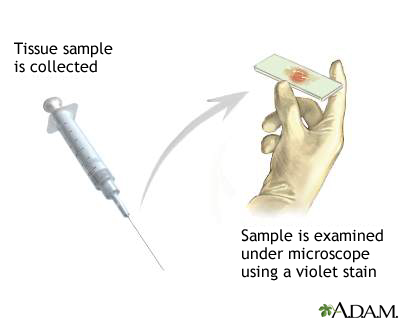Health Library
Pulmonary actinomycosis
Actinomycosis - pulmonary; Actinomycosis - thoracic
Pulmonary actinomycosis is a rare lung infection caused by one of several specific bacteria.
Images


I Would Like to Learn About:
Causes
Pulmonary actinomycosis is caused by certain bacteria normally found in the mouth and gastrointestinal tract. The bacteria often do not cause harm. But poor dental hygiene and tooth abscess can increase your risk for lung infections caused by these bacteria.
People with the following health problems also have a higher chance of developing the infection:
- Alcohol use
- Scars on the lungs (bronchiectasis)
- Chronic obstructive pulmonary disease (COPD)
The disease is rare in the United States. It may occur at any age but is most common in people 30 to 60 years old. Men get this infection more often than women.
Symptoms
The infection often comes on slowly. It may be weeks or months before diagnosis is confirmed.
Symptoms may include any of the following:
- Chest pain when taking a deep breath
- Cough with phlegm (sputum)
- Fever
- Shortness of breath
- Unintentional weight loss
- Lethargy
- Night sweats (uncommon)
Exams and Tests
Your health care provider will perform a physical exam and ask about your medical history and symptoms. Tests that may be done include:
- Bronchoscopy with culture
- Complete blood count (CBC) with differential
- Chest x-ray
- Chest CT scan
- Lung biopsy
- Modified AFB smear of sputum
- Sputum culture
- Tissue and sputum Gram stain
- Thoracentesis with culture
- Tissue culture
Treatment
The goal of treatment is to cure the infection. It may take a long time to get better. To be cured, you may need to receive the antibiotic penicillin through a vein (intravenously) for 2 to 6 weeks. Then you need to take penicillin by mouth for a long period. Some people need up to 18 months of antibiotic treatment.
If you cannot take penicillin, your provider will prescribe other antibiotics.
Surgery may be needed to drain fluid from the lungs and control the infection.
Outlook (Prognosis)
Most people get better after treatment with antibiotics.
Possible Complications
Complications may include:
- Brain abscess
- Destruction of parts of the lungs
- COPD
- Meningitis
- Osteomyelitis (bone infection)
When to Contact a Medical Professional
Contact your provider if:
- You have symptoms of pulmonary actinomycosis
- Your symptoms get worse or do not improve with treatment
- You develop new symptoms
- You have a fever of 101°F (38.3°C) or higher
Prevention
Good dental hygiene may help reduce your risk for actinomycosis.
Related Information
Dental care - adultTooth abscess
Pleural effusion
Brain abscess
Meningitis
Osteomyelitis
Empyema
References
Brook I. Actinomycosis. In: Goldman L, Cooney KA, eds. Goldman-Cecil Medicine. 27th ed. Philadelphia, PA: Elsevier; 2024:chap 304.
Russo TA. Agents of actinomycosis. In: Bennett JE, Dolin R, Blaser MJ, eds. Mandell, Douglas, and Bennett's Principles and Practice of Infectious Diseases. 9th ed. Philadelphia, PA: Elsevier; 2020:chap 254.
BACK TO TOPReview Date: 3/16/2024
Reviewed By: Jatin M. Vyas, MD, PhD, Associate Professor in Medicine, Harvard Medical School; Associate in Medicine, Division of Infectious Disease, Department of Medicine, Massachusetts General Hospital, Boston, MA. Also reviewed by David C. Dugdale, MD, Medical Director, Brenda Conaway, Editorial Director, and the A.D.A.M. Editorial team.
 | A.D.A.M., Inc. is accredited by URAC, for Health Content Provider (www.urac.org). URAC's accreditation program is an independent audit to verify that A.D.A.M. follows rigorous standards of quality and accountability. A.D.A.M. is among the first to achieve this important distinction for online health information and services. Learn more about A.D.A.M.'s editorial policy, editorial process and privacy policy. A.D.A.M. is also a founding member of Hi-Ethics. This site complies with the HONcode standard for trustworthy health information: verify here. |
The information provided herein should not be used during any medical emergency or for the diagnosis or treatment of any medical condition. A licensed medical professional should be consulted for diagnosis and treatment of any and all medical conditions. Links to other sites are provided for information only -- they do not constitute endorsements of those other sites. No warranty of any kind, either expressed or implied, is made as to the accuracy, reliability, timeliness, or correctness of any translations made by a third-party service of the information provided herein into any other language. © 1997- 2025 A.D.A.M., a business unit of Ebix, Inc. Any duplication or distribution of the information contained herein is strictly prohibited.
